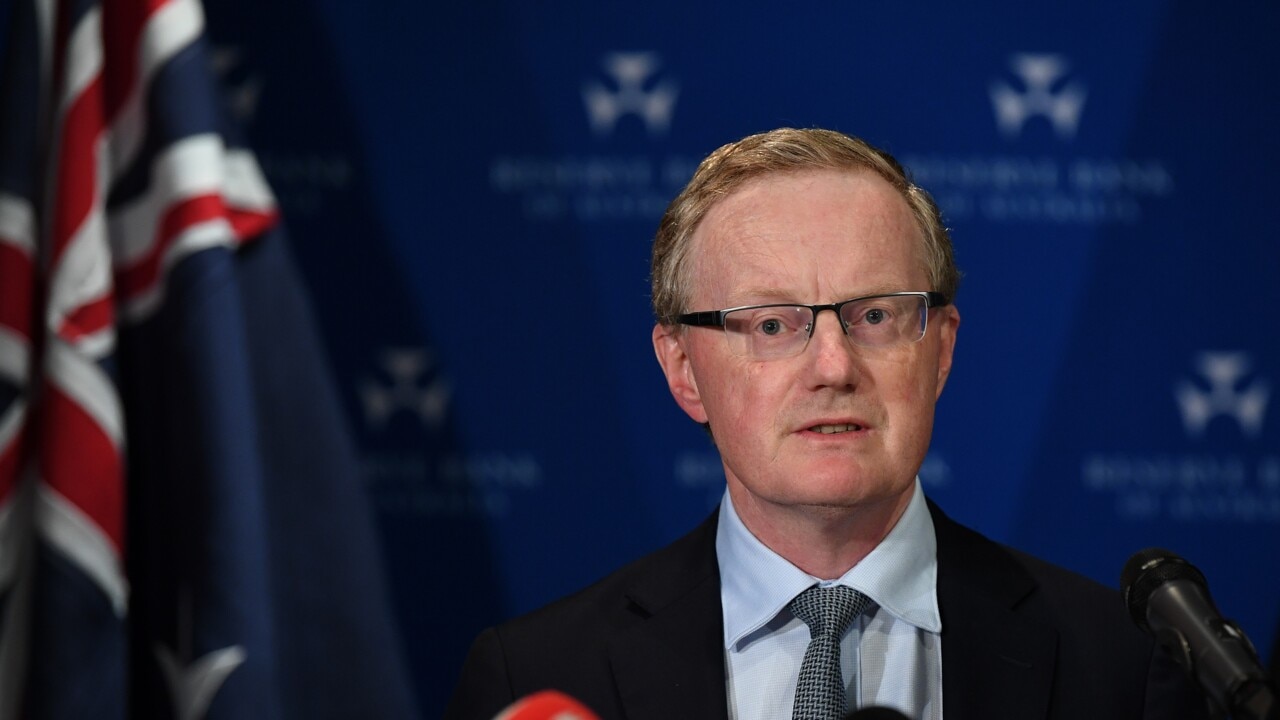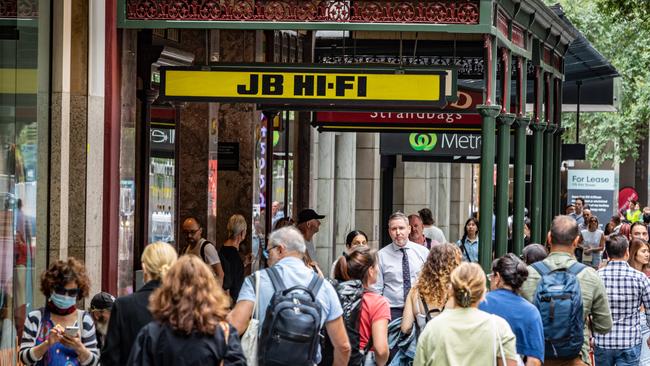Reserve Bank governor Philip Lowe warns that interest rate hikes may not be over
Philip Lowe has pushed back on market speculation that interest rate hikes are finished after the central bank left the official cash rate on hold for the first time in a year.

Reserve Bank governor Philip Lowe has pushed back on market speculation that interest rate hikes are finished after the central bank left the overnight cash rate on hold after 10 consecutive hikes.
In a National Press Club speech on “monetary policy, demand and supply”, Lowe said the decision to hold rates steady this month “does not imply that interest rate increases are over.”
While consistent with the view of many economists, that a final 25 basis point rate hike is likely in May, the hawkish message from the RBA governor was in sharp contrast to market pricing.
Even after Lowe’s speech, cash rate futures implied little chance of any more interest rate hikes this year. Moreover, a 25 basis point cut was almost fully priced in for December.
Asked whether the RBA will either hike again in May or not at all, Lowe said that if the RBA were to keep interest rates on hold next month, it “doesn’t mean we’re going to hold right through the course of the year.” Moreover, he said it was “premature to be talking about interest rate cuts”.
“Remember, we’ve got the highest inflation rate in 30 years, the lowest unemployment rate in 50 years, and it’s still two years before we’re getting inflation back to the top of the target range,” he said. “So, I think it’s too early, way too early, to be talking about interest rate cuts, and the balance of risk lies to further rate rises, but it will depend upon the data.”
As to why the RBA chose to pause its interest rate hikes while other central banks continued to hike, Lowe noted that Australia’s wages growth has been relatively low, and its predominantly variable interest rate debt meant the average mortgage rate paid in Australia has risen faster than overseas.
He also said the RBA is “prepared to live with a slightly slower return to target inflation than others.”
“We’ve discussed that at our board meetings – whether it would be beneficial to get inflation back down to 3 per cent a year earlier. There’s an argument for that, but it would mean more job losses, and our judgment at the moment is that if we can inflation back to 3 per cent by mid-2025 and preserve many of those job gains that have been delivered in the last few years, that’s a better outcome than getting inflation back to 3 per cent one year earlier, and having more job losses.”
He said these factors “at least establish a plausible case that interest rates in Australia don’t have to go up to the same level as we’ve seen elsewhere around the world,” Lowe added.
But he also noted that “there are a lot of uncertainties here and that could change.”
Dr Lowe was also asked whether inflation risks from the OPEC+ cartel’s decision to further limit oil supplies, calls for inflation-linked increases in minimum and award wages, high growth in residential rents and renewed upward pressure on house prices meant rates are likely stay high, even if other countries begin to cut interest rates late this year as markets have recently come to expect.
He replied that there was also downward pressure on inflation, such as the price of shipping, which was yet to be fully reflected in goods price, but the RBA will keep rates high if needed.

“We’re expecting over the months ahead to see quite weak growth in the prices of consumer durables, demand has weakened and shipping costs and waiting times are back to normal, so we expecting that to flow through, and the Government’s initiative in the energy market to reduce the rate of increase in electricity prices will also help.”
It came as the Reserve Bank of New Zealand announced a bigger-than-expected 50 basis point hike in its official cash rate to 5.25 per cent. The RBNZ said demand in NZ continues to significantly outpace the economy’s supply capacity, thereby maintaining pressure on annual inflation.”
“The recent severe weather events in the North Island have led to higher prices for some goods and services,” it said. “This higher near-term CPI inflation increases the risk that inflation expectations persist above our target range.” The RBNZ said its cash rate “needs to be at a level that will reduce inflation and inflation expectations to within the target range over the medium term.”
But Lowe said given that Australian monetary policy was “now in restrictive territory”, there were “significant economic uncertainties at the moment” and the full effect of its rate hikes was yet to be felt, it was “time to hold interest rates steady and accumulate more information.”
He noted that this approach is “consistent with our practice in earlier interest rate cycles.”
“In those earlier cycles, it was common for the Board to move interest rates multiple times, then wait for a while to assess the pulse of the economy, and move again if the situation warranted doing so,” Dr Lowe added. “So, it is a return to that world.”
He outlined three key factors that will be crucial to the RBA’s assessment of interest rate settings.
These were “the “outlook for the global economy, especially in light of the recent banking stresses in the United States and Switzerland”, the “strength of household consumption”, and “how price-and wage-setting behaviour responds to this period of higher inflation”.
“Globally, inflation remains too high and services price inflation is proving to be worryingly persistent,” Dr Lowe said. “Global economic growth has slowed to a below-average pace, and the outlook – even before the recent banking problems – was for this to continue.”
While noting that financial stability concerns have eased a little, he said recent banking stress will tighten financial conditions as banks take a more cautious approach to lending.
“It is still unclear what effect this will have on global economic growth, but it is another headwind,” he said. Australia’s banks remain “well positioned to provide the credit and other financial services that the economy needs”, but it “does not mean that Australia is immune to stresses abroad.”
On household consumption, it was “increasingly clear” that higher rates are “having an impact”.
Low unemployment and pandemic-era savings are being offset by cost-of-living pressure “squeezing household budgets across the country” and a fall in house prices has reduced household wealth.
The predominance of variable-rate mortgages in Australia means that this is a “more powerful transmission mechanism of monetary policy than in many other countries.”
Savings buffers are “unevenly spread across households” and while many households have built up large buffers in their mortgage offset accounts, around 30 per cent of owner-occupiers with variable-rate loans have an offset or redraw balance of less than three months’ repayments.
“There are still many fixed-rates borrowers yet to transition to higher variable rates,” Lowe added.
“It is also unclear how those who have built up additional savings will use them.”
Wages outcomes have been consistent with inflation returning to target “provided there is some pick-up in productivity growth”.
But it was “important that wage increases remain broadly consistent with the inflation target” and that a widening of profit margins does not become a source of ongoing upward pressure on prices.”




To join the conversation, please log in. Don't have an account? Register
Join the conversation, you are commenting as Logout